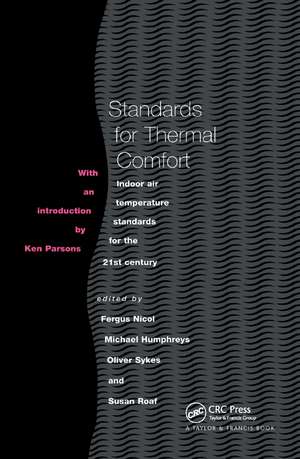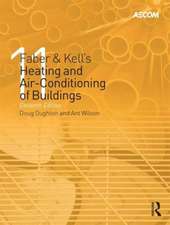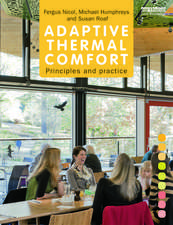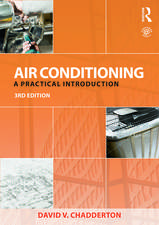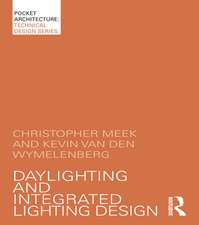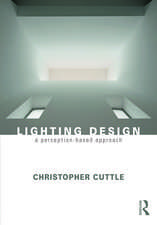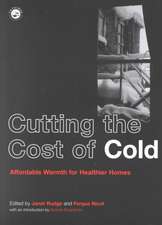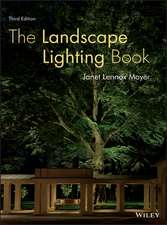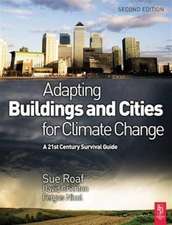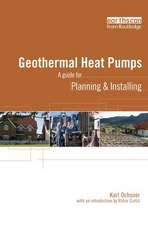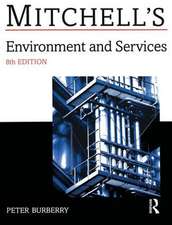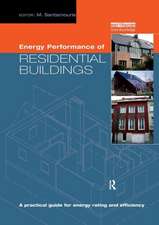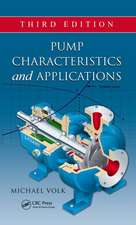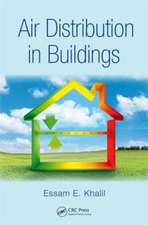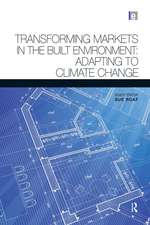Standards for Thermal Comfort: Indoor air temperature standards for the 21st century
Autor M. Humphreys, F. Nicol, S. Roaf, O. Sykesen Limba Engleză Paperback – 5 sep 2019
| Toate formatele și edițiile | Preț | Express |
|---|---|---|
| Paperback (1) | 489.26 lei 6-8 săpt. | |
| CRC Press – 5 sep 2019 | 489.26 lei 6-8 săpt. | |
| Hardback (1) | 1329.36 lei 6-8 săpt. | |
| CRC Press – 30 mar 1995 | 1329.36 lei 6-8 săpt. |
Preț: 489.26 lei
Preț vechi: 575.60 lei
-15% Nou
Puncte Express: 734
Preț estimativ în valută:
93.62€ • 100.11$ • 78.06£
93.62€ • 100.11$ • 78.06£
Carte tipărită la comandă
Livrare economică 17 aprilie-01 mai
Preluare comenzi: 021 569.72.76
Specificații
ISBN-13: 9780367401740
ISBN-10: 0367401746
Pagini: 261
Dimensiuni: 156 x 234 x 18 mm
Greutate: 0.45 kg
Ediția:1
Editura: CRC Press
Colecția Routledge
ISBN-10: 0367401746
Pagini: 261
Dimensiuni: 156 x 234 x 18 mm
Greutate: 0.45 kg
Ediția:1
Editura: CRC Press
Colecția Routledge
Public țintă
Professional Practice & DevelopmentCuprins
List of participants. Preface. Introduction -Dr Ken C Parsons. Session 1. Thermal comfort temperatures and the habits of Hobbits. Towards new indoor comfort temperatures for Pakistani buildings. Discussions to Session 1.
Session 2. Temperature standards for the tropics? New thermal comfort standard of the Czech Republic. Comfort, preferences or design data? Pale green, simple and user friendly: occupant perceptions of thermal comfort in office buildings. Designing for the individual: a radical reading of ISO 7730. An empirical model for predicting air movement preferred in warm office environments. Discussions to session 2.
Session 3. ISO standards and thermal comfort: recent developments. Comfort and air movement in a naturally ventilated room. Thermal comfort in Thai air-conditioned and naturally ventilated offices. Thermal comfort in air-conditioned buildings in the tropics. Discussions to Session 3.
Session 4. Deliberate design. Discussions on human thermal comfort in Vietnam. Thermal comfort and temperature standards in Pakistan. Discussions to session 4.
Session 5. Comfort conditions in PASCOOL surveys. Comfort standards from field surveys in the leisure industry. What is thermal comfort in a naturally ventilated building? The energy implications of a climate-based indoor air temperature standard. An adaptive guideline for UK office temperatures. Discussions to session 5. Final plenary discussion.
Poster presentations. Design parameters of a non-air-conditioned passive solar house for cold climate of Srinager, India. Higher PMV causes higher energy consumption in air-conditioned buildings: a case study in Jakarta, Indonesia. Thermal comfort of factory workers in Northern India. Warm and sweaty: thermal comfort in two naturally ventilated offices in Sydney, NSW.
Session 2. Temperature standards for the tropics? New thermal comfort standard of the Czech Republic. Comfort, preferences or design data? Pale green, simple and user friendly: occupant perceptions of thermal comfort in office buildings. Designing for the individual: a radical reading of ISO 7730. An empirical model for predicting air movement preferred in warm office environments. Discussions to session 2.
Session 3. ISO standards and thermal comfort: recent developments. Comfort and air movement in a naturally ventilated room. Thermal comfort in Thai air-conditioned and naturally ventilated offices. Thermal comfort in air-conditioned buildings in the tropics. Discussions to Session 3.
Session 4. Deliberate design. Discussions on human thermal comfort in Vietnam. Thermal comfort and temperature standards in Pakistan. Discussions to session 4.
Session 5. Comfort conditions in PASCOOL surveys. Comfort standards from field surveys in the leisure industry. What is thermal comfort in a naturally ventilated building? The energy implications of a climate-based indoor air temperature standard. An adaptive guideline for UK office temperatures. Discussions to session 5. Final plenary discussion.
Poster presentations. Design parameters of a non-air-conditioned passive solar house for cold climate of Srinager, India. Higher PMV causes higher energy consumption in air-conditioned buildings: a case study in Jakarta, Indonesia. Thermal comfort of factory workers in Northern India. Warm and sweaty: thermal comfort in two naturally ventilated offices in Sydney, NSW.
Notă biografică
Humphreys, M.; Nicol, F.; Roaf, S.; Sykes, O.
Descriere
Standards for Thermal Comfort brings together contributions from around the world, reflecting new approaches to the setting of standards which can apply to all climates and cultures.
